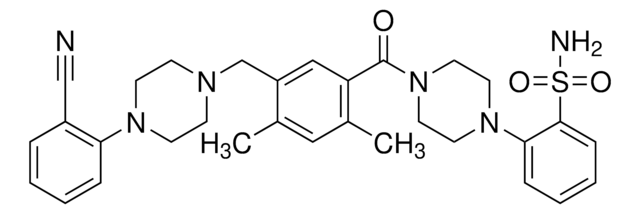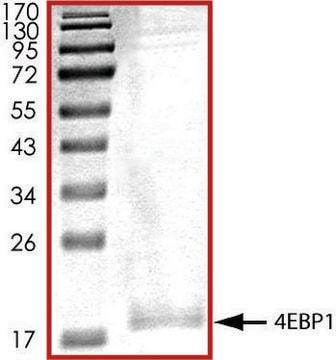SRP0255
eIF4E Active human
N-terminal GST-tag, recombinant, expressed in E. coli, ≥70% (SDS-PAGE)
Synonyme(s) :
CBP, Eukaryotic translation initiation factor 4E, mRNA cap-binding protein
About This Item
Produits recommandés
Source biologique
human
Produit recombinant
expressed in E. coli
Pureté
≥70% (SDS-PAGE)
Forme
aqueous solution
Poids mol.
51 kDa
Conditionnement
pkg of 100 μg
Concentration
>0.02 mg/mL
Technique(s)
cell based assay: suitable
Adéquation
suitable for molecular biology
Numéro d'accès NCBI
Numéro d'accès UniProt
Conditions d'expédition
dry ice
Température de stockage
−70°C
Informations sur le gène
human ... EIF4E(1977)
Description générale
Application
Actions biochimiques/physiologiques
Forme physique
Notes préparatoires
Code de la classe de stockage
10 - Combustible liquids
Classe de danger pour l'eau (WGK)
WGK 1
Point d'éclair (°F)
Not applicable
Point d'éclair (°C)
Not applicable
Certificats d'analyse (COA)
Recherchez un Certificats d'analyse (COA) en saisissant le numéro de lot du produit. Les numéros de lot figurent sur l'étiquette du produit après les mots "Lot" ou "Batch".
Déjà en possession de ce produit ?
Retrouvez la documentation relative aux produits que vous avez récemment achetés dans la Bibliothèque de documents.
Notre équipe de scientifiques dispose d'une expérience dans tous les secteurs de la recherche, notamment en sciences de la vie, science des matériaux, synthèse chimique, chromatographie, analyse et dans de nombreux autres domaines..
Contacter notre Service technique








